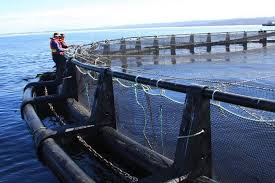Tighter salmon regulation on the way says Sepa

SOME 81.4 per cent of Scotland’s salmon farms achieved ‘excellent’ or ‘good’ environmental ratings for last year from Sepa, the Scottish Environment Protection Agency.
The just published compliance figures for all regulated Scottish businesses and organisations showed salmon farms’ compliance levels dropped slightly, from a peak of 85.75 per cent in 2016.
Non-compliant fish farms rose from 50 to 56 failing sites in 2017 due to a lack of monitoring or abstraction data being submitted on time by fish farm operators, said Sepa.
And there was an increase in farms failing due to effluent treatment issues.
In a statement, the agency said: ‘Sepa is firmly committed to protecting and enhancing Scotland’s environment, and will shortly announce a revised regulatory regime that will firmly strengthen the regulation of the sector and a comprehensive programme of public engagement across Scotland.
‘The regime will include fresh modelling, using the best available science, enhanced site based environmental monitoring, a new approach to sustainable siting of marine cage fish farms, and new approach for controlling the use of medicines, aligned with encouraging innovation in the containment of marine waste.’
The Scottish Salmon Producers’ Organisation’s chief executive, Julie Hesketh-Laird, said:
‘Sepa’s compliance assessment scheme data for 2017 shows that the vast majority of Scottish salmon farms are compliant and 81 per cent of all Scottish aquaculture businesses were rated excellent or good.
‘The Scottish salmon industry is committed to good environmental performance. In 2017 there was a slight drop in the industry’s compliance rate though we understand from Sepa that the issues have not led to any environmental deterioration.
‘The industry works closely with Sepa to ensure it meets required standards, and addresses issues promptly where there is room for improvement.
‘Indeed this is central to the way compliance is assessed, with farms required to demonstrate action to remedy non-compliance. The industry is committed to raising standards higher.
‘Individual SSPO member companies will work quickly with Sepa to address issues where they arise.’
The salmon farming sector has been subject to two parliamentary inquiries this year and is currently awaiting the findings of the most recent probe, by the Rural Economy and Connectivity committee.
The SSPO recently appointed a senior member of the Sepa team, Anne Anderson, as its new director of sustainability.
Yesterday, Scottish environment minister Roseanna Cunningham highlighted the importance of a healthy environment to the aquaculture industry as she opened the ASSG conference in Oban today.
The sector as a whole must ‘demonstrably’ take its environmental responsibilities seriously, she said.

